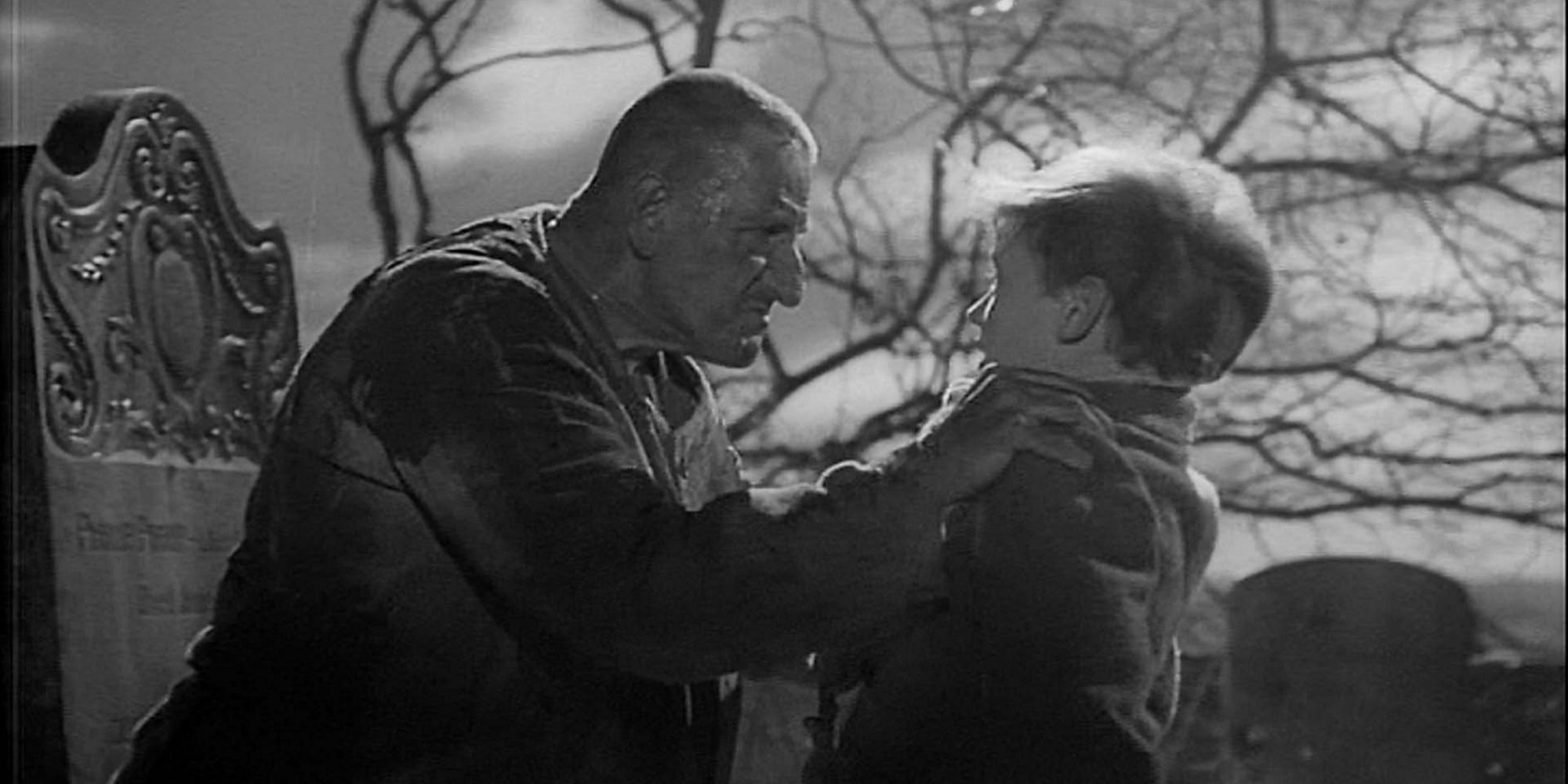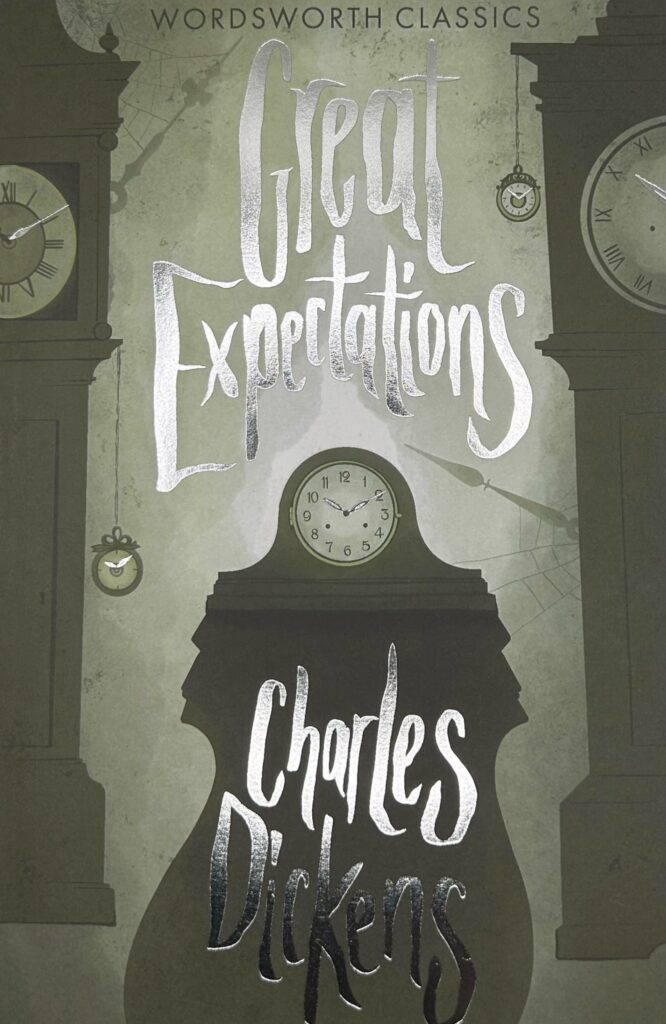
Sally Minogue looks at Great Expectations
Continuing our ‘Dickensian’ theme, Sally Minogue looks at one of the author’s most popular works, Great Expectations.
Great Expectations has one of the most frightening openings of any English novel. It inscribes itself on the imagination of the reader just as the sudden apparition of the escaped convict Magwitch must have carved itself on poor Pip’s seven-year-old heart, like the shapes of the letters on the tombstones surrounding him. Not enough that he has been dwelling on the graves and stone markers of his dead father and mother and five little brothers in the dark, marsh-misty graveyard. Now comes the moment when he discovers ‘that the small bundle of shivers growing afraid of it all and beginning to cry, was Pip.’ (Chapter 1) When the ‘terrible voice’ of Magwitch threatens to cut his throat, when the ‘fearful man, all in coarse grey, with a great iron on his leg’ starts up ‘from among the graves’, then comes Pip’s first realisation of himself. It is this poor self and what comes of it that the novel extensively examines; and after all, what is more, interesting than the close consideration of ourselves?
Great Expectations (1861) is the penultimate of Dickens’s completed novels, but only his second use of a first-person narrator (the other is in David Copperfield, a decade earlier). Both novels are thought to echo Dickens’s own life in certain ways, and so the adoption of the first person is apt. But as in all such narrations – Charlotte Brontë’s Jane Eyre is a similar case – there is a double uncertainty for the reader. Firstly, how much is the character-narrator revealing and how much concealing? For in a novel which looks back on the formation of life – a bildungsroman – the process of self-revelation can only be shared by the reader if s/he is kept in ignorance of what is to come at certain points, just as the narrating self was also once in ignorance. Secondly, is the controlling hand of the author clearly separate from the narrator, or embedded within him or her?
In Great Expectations, there is a striking congruence between author and narrator. The many ironies and dissonances that arise stem from Pip’s own adult understanding of himself and his many errors. Thus there are key points in the story where a rueful or remorseful note enters, where the narrator turns a critical eye on his younger self. But these remain within the bounds of his own process of self-revelation, in the same way, that we may feel sadness about our own past faults when reflecting back. They are not authorial judgements but Pip’s sorrowful judgements upon himself, and thereby stronger in their effect on the reader. Nor do they ever eclipse the full and honest gaze of the older self upon a younger self he recognises to have behaved very badly. This is complicated in Great Expectations because the older Pip has to recognise his own self-deception about his motives. This makes the novel painful reading for anyone who recognises having performed similar self-deceptions.
Most of Pip’s errors stem from his desire to be a gentleman – a desire placed unfairly on and in him by his ‘great expectations’, but at the same time grasped by him gladly, gratefully and with a full readiness to erase the past. The meeting with Estella begins the split within him; he becomes hopelessly in thrall to her at the very same time as she makes him ashamed of himself. (Chapter 8) This makes him in turn ashamed of his life at the forge, so that when he comes into ‘a handsome property’ it is what he has already in some way been led to expect. (Chapter 18) He is only too glad to leave the world of the forge behind him and with it all those who love him. As yet he does not realise that he is also leaving all those he loves, for at this moment his knowledge of the abiding loves has deserted him.
We can scarcely blame Pip for his desire to escape and to better himself, but along with it goes a loss of moral compass. The triumphal buying of the new clothes, having them delivered to Pumblechook’s rather than to the forge, the tussle with himself over having Joe accompany him to the coach and deciding no – Pip loses every moral battle with himself and painfully records everyone. (Chapter 19) The apotheosis of this comes with Joe’s visit to his rooms in London. The self-narrating older Pip freely admits: ‘If I could have kept him away by paying money, I certainly would have paid money’. (Chapter 27) The worst of this is that ‘I had little objection to his being seen by Herbert or his father, for whom I had respect; but I had the sharpest sensitiveness as to his being seen by Drummle, whom I held in contempt. So, throughout life, our worst weaknesses and meannesses are usually committed for the sake of the people we most despise.’ (27)
As is the case with bildungsroman – more than in life – Pip does redeem himself, and not in the obvious ways. It is the revelation that Magwitch has all along been his benefactor that prompts the ‘sharpest and deepest pain of all – it was for the convict, guilty of I knew not what crimes … that I had deserted Joe.’ (Chapter 39) In that, it is a craven understanding; he was happy to desert Joe when he thought Miss Havisham was his benefactor. But it brings about a moment of deep understanding: ‘I could never, never, never, undo what I had done.’
That inability to undo underlies all the subsequent making of amends; Pip is never let off the hook, except by those more generous than himself – Magwitch and Joe, twin fathers, each a model of goodness in his own way. But Pip is allowed to forgive himself, if only by admitting all. And if we reflect back as readers on that beginning – what chance did he have? When Magwitch upends him so that the steeple is under his feet, his childish world is turned upside down. He never quite recovers from that until Magwitch starts up again in his chambers, to give him a chance to reconcile past and present through transformative knowledge. Magwitch too has been formed by that moment in the graveyard, impelled by hope and love as he has unwittingly impelled Pip towards their diametric opposites. It is the joy of narrative, of the essentially sentimental Dickens, and of the self-told story of a life, that in the end – things are made right.
Books associated with this article
